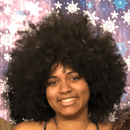Any normal person who is more politically and culturally in tune with current affairs, would fill their social media feed with relevant material to further their education and understanding of the world. I, on the other hand, still follow the same YouTubers and Vloggers I have been watching since middle school.
Recently, there has been a call to action about debunking what an “influencer” or “VSCO girl” is, simultaneously calling out the absurdity of these titles. I will admit that there were times in my adolescence when I thought to myself, being a YouTuber would be such a fun job. More recently, I have even asked myself am I a VSCO girl? Afterall, I own an absurd amount of scrunchies, go to bed with a high ponytail atop my head, own clothes from Urban Outfitters, eat avocado toast, sip water from a hydro flask, and enjoy matcha lattes. I’m not saying my childhood dream has come true, far from it; in fact, I don’t want to be pinholed as an influencer.
Pictured above: Grace Helbeig sporting her “VSCO girl look.”
Grace Helbeig, one of my all time favorite comedian YouTubers, who has also written books, starred in TV shows and films, and hosts her own podcast, posted a video in which she and her partner dressed up like VSCO girls. They of course were mocking the entire concept of this identity, buying clothes from Ross’s Dresses for Less. Like always, Helbeig successfully poked fun at a social trend to point out the absurdity of overpriced water bottles and putting your hair in such a high ponytail that more than half of the strands fall out. I mean, when exactly did oversized sweatshirts as dresses become a thing?
Loungewear is a whole other niche to the “influencer” lifestyle. Many avoid influencer accounts at all costs as their luxurious lifestyles make them feel a tiny bit sad about their somewhat mediocre lives as college students. Personally, I find entertainment in following the lives of YouTubers and Influcners; yes it can be sad to realize that I do not own a loft apartment in downtown LA with my best friend, but hey, at least I can take pictures of my iced latte from Starbucks and fake it until I make it.
Pictured above: Lauren Elizabeth wearing one of her simple, chic looks.
I am not the only one having an existential crisis about my identity. Lauren Elizabeth, a YouTuber and Vlogger, posted on her Instagram story a screenshot of Urban Dictionary’s definition of a VSCO girl and captioned the photo “learning a lot through my quarter life crisis, vlog coming Friday.” Although this statement shows privilege, leading the influencer life isn’t perfect. In some ways, this role has become a new irradiation of a celebrity and by default these famous vloggers must deal with the same harassment, social pressures, and press that Hollywood’s A-listers face.
One positive thing about this VSCO girl trend is that YouTubers who fit this stereotype can use their platform to speak about important issues. Although Lauren Elizabeth spends time preaching about Whole Foods and the importance of self-care, she has also dedicated numerous videos discussing mental health and chronic pain. Meredith Foster, another Influencer, has been a favorite YouTuber of mine for years. She may spend time vlogging Floralia and videoing hauls of her latest buys at Target, but she recently used her YouTube channel to talk about recovering from her eating disorder. Alexa Losey, who was a YouTuber recommended to me by a girl in my freshman year biology class who quite literally said “once you start watching her videos, you will see how perfect she is,” recently took a break from YouTube. In her video “I left YouTube and this is why,” she explains that she was struggling with body dysmorphia and anxiety while filming a TV show and finishing a degree in Marketing, Journalism, and Religious Studies. Losey was still doing all of the impressive things she does, including being an influencer for Marc Jocabs, but she was not posting these projects on her channel. After discussing her history with mental health, Losey was contacted by the press and people wanting to write thesis papers arguing that influencers struggle with mental health and holding such a position is the worst thing you could do. All of these YouTubers, while fitting the VSCO girl definition, still use their platform to influence their followers for the better.
Pictured above: One of several posts Meredith Foster posted on her Instagram discussing her eating disorder.
As a Her Campus Trendsetter myself, this discussion on influencers and the supposed corruption of the title has made me question my role with social media. The New York Times published an article chronicling how multiple influencers were impersonated by people who would then steal merchandise sent to the real influencers by brands. Influencers are in many ways playing into the capitalist machine of materialism, but this begs the question whether people actually listen to influencers. Katy Bellotte, a YouTuber and podcaster who does social and digital work for Loreal Makeup, posted to her Instagram story asking whether people took influencer’s advice. Personally, I take what I see with a grain of salt. I am usually not scrolling through my feed to take influencer’s recommendations on the latest makeup brands or fashion styles, but rather as a means of self-care to distract myself from daily stressors. However, I have been persuaded by YouTubers to purchase a makeup brush here or try a skincare brand there. That being said, I don’t think influencers and VSCO girls are a cringe-worthy aspect of pop culture. They may make us want to cry into a pillow about our boring lives, but we can’t forget that social media does not always show the whole truth.



